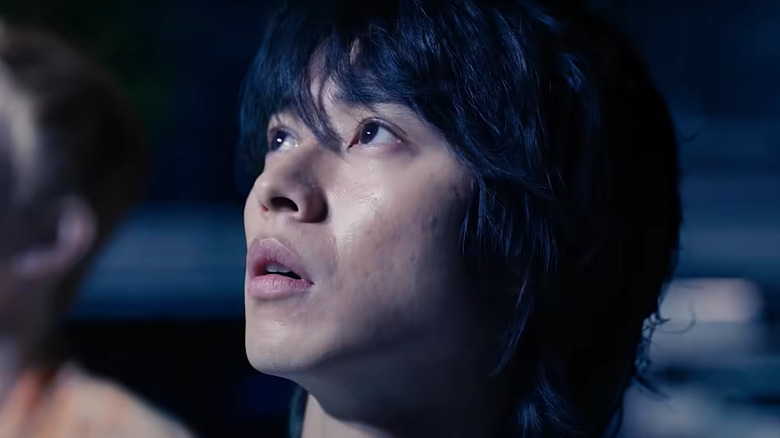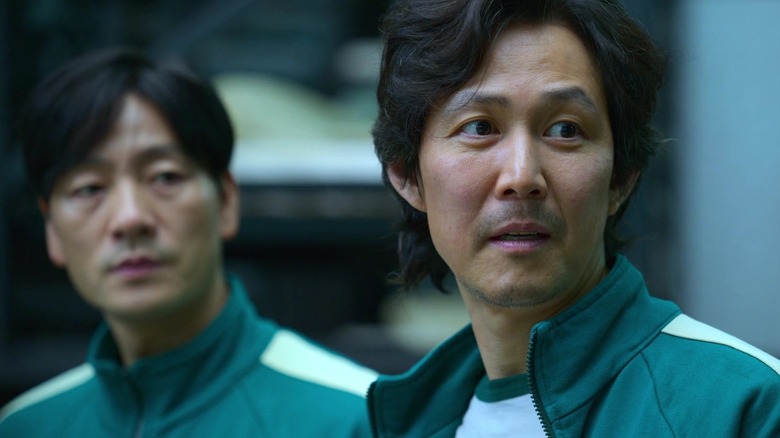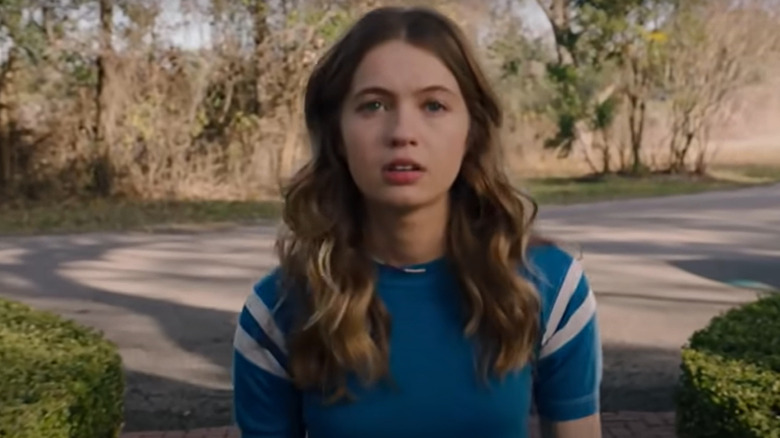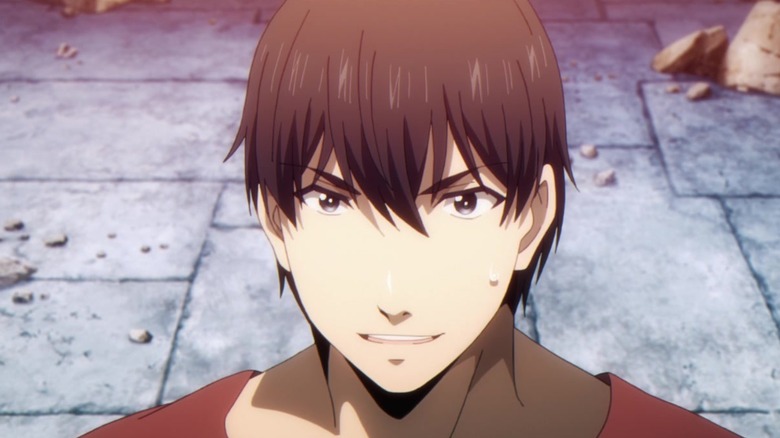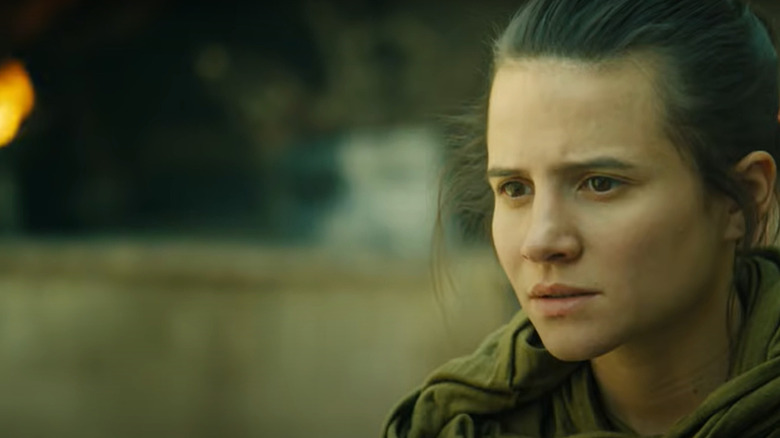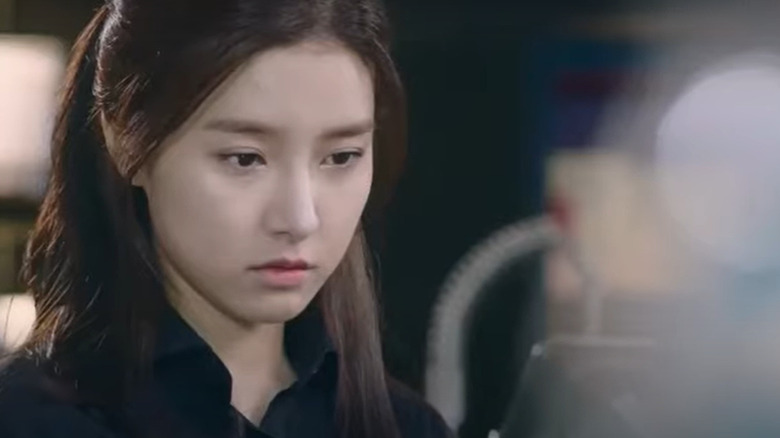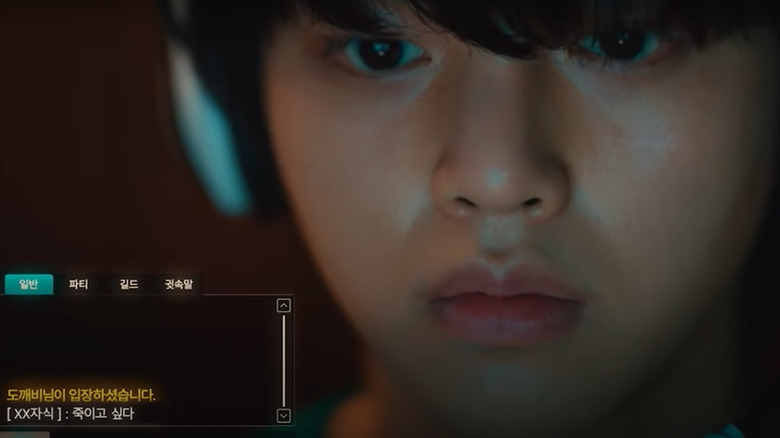Shows Like Alice In Borderland That Thriller Drama Fans Need To See
When 2020's "Alice in Borderland" took a page out of the "Vanilla Sky" book to depict the lifeless streets of a once-bustling metropolis, it likely had no idea how vividly it would be imitating life for contemporary viewers. In this gripping Japanese series, Arisu (Kento Yamazaki) and his friends find themselves trapped in a Tokyo that is drained of its lifeblood: its people. The trio has to partake in a series of life-or-death challenges to extend their stay in the bewildering purgatory of Borderland — and ensure their survival in the real world.
In the battle royale of "Battle Royale"-style nail-biters, "Alice in Borderland" would take the cake. This series has all the ingredients that make a meaty thriller: gore, suspense, and best of all, gameplay. Add to that some creative elements of science-fiction and you've got the whole package. The show's only shortcoming might be how quickly its eight-episode 1st season concluded. But thankfully, the following shows might fill the "Alice in Borderland"-sized hole in your daily Netflix diet.
Squid Game
"Squid Game" is an obvious choice for this list, and not just because "Alice in Borderland" has been living in its giant shadow. Let this not be an indication of the latter's inferiority, but of its uncanny similarity (and equal watchability) to the former. Both derive their titles from popular relics of childhood and capitalize on that nostalgia by putting sinister twists on games of whimsy.
At their core, these shows are parables masquerading as game-based battles to the death. In "Squid Game," cash-strapped contestants attempt to recoup their debts by making an even bigger gamble: participating in a series of Korean children's games that will end either in certain death or unimaginable riches.
If "Alice in Borderland" wagers a bet against human nihilism and for optimism, "Squid Game" doubles down on that bet. Both shows posit that the most grotesque moral predicaments can bring out the best of humanity.
Panic
If there ever was a series aptly named for its premise, it would be "Panic," in which teenage rebellion is reflected through the prism of high-stakes dares. Growing up in a small town has clearly afforded little choice and opportunity to the youngsters of Carp, Texas, especially Heather Nill (Olivia Welch), a bright teenager from a troubled home. So when these teens are suddenly faced with grave choices where survival and freedom from their former lives hang in the balance, things understandably come to a head.
Arisu and his rag-tag gang are not unlike the youth of Carp: carefree young adults one day, juggling life and death the next. The only difference is that Heather and the rest of Carp's daredevils are on the cusp of adulthood, while Arisu and his friends are already in the early stages of it.
"Panic" is part survival thriller and part conspiracy theory. Unbeknownst to the teenagers, outside forces influence the outcomes of the game, precisely like the game masters in "Alice in Borderland." If you love unpacking a tightly-wound plot while along for the thrilling ride of gameplay, you and "Panic" are a match made in hair-raising heaven.
Darwin's Game
Of all the shows on this list, "Darwin's Game" arguably bears the closest resemblance to "Alice in Borderland." Sudō Kaname (Yūsuke Kobayashi) is your average high schooler — until he receives a mysterious invitation to an online game. When Kaname opens the game and a snake leaps forth from within, he finds himself immersed in a real-life battle to the death. Each player in the game receives a "Sigil" — a superpower of sorts, and their only saving grace.
Games that come alive are a common motif in both shows. "Alice in Borderland" translates its protagonist's screen-based skills to real life: Arisu, who cut his competitive teeth on many a video game, now engages with real-life gameplay and its consequences. Not only do they find themselves in similar predicaments, but Arisu and Kaname themselves are alike enough to be brothers from parallel universes. While both are experts at strategic thinking, they don't exploit their upper hand to harm their competitors, choosing instead to help them when they can.
3%
If you took the dystopian savagery of "Alice in Borderland" and merged it with the anti-establishment undertones of "Squid Game," you'd get "3%." In the bleakest of post-apocalyptic dystopias, destitute 20-year-olds undergo a rite of passage called the "The Process" for a chance at a more fulfilling life. Like the title suggests, however, the odds are stacked against them.
The Process — a series of increasingly difficult tasks that challenge contestants' mental, emotional, and physical abilities — is designed to enforce a meritocracy that aims to single out the fittest, whisk them away to a distant utopia called the Offshore, and leave the rest to survive the uncaring world on their own.
In "3%," the Inland's grime and gore stand in stark contrast to the Offshore's sleekness and technological marvel. This series and "Alice in Borderland" take place in variations on the same kind of society. The broad dystopian landscape in both shows also contains a utopia that promises pleasures beyond its characters' wildest imaginations — but only at the expense of the less fortunate majority.
Liar Game
If the thrill you seek lies in psychological warfare, then "Liar Game" is precisely your cup of terribly bitter tea. There's a sound reason why Hearts games in "Alice in Borderland" are notorious for their difficulty: As advertised, they require competitors to play with the hearts of their opponents. Picture such games all series long, minus the bloodshed but double the heartache, and you get the 2014 series "Liar Game."
"Liar Game" follows a reality show in which contestants weave webs of deceit and attempt to trap their rivals within them — all with millions of dollars at stake. To win, the contestants' only available weapons are manipulation, betrayal, and persuasion.
Our protagonist Nam Da-jung (Kim So-eun) is cut from a tamer cloth than her ruthless competitors, often playing the role of the duped, not duper. But what some may call naivety or ignorance is actually a steadfast idealism and a utilitarian belief in the common good. You'll come for the twisted premise but stay to root for the heroine.
Sweet Home
As the titles of both shows suggest, location is pivotal to the premise of both "Alice in Borderland" and this South Korean series. In "Sweet Home," Cha Hyun-soo (Song Kang) suddenly finds his apartment complex overrun with creatures not remotely human. "Sweet Home" has all the trappings of a classic zombie flick, with none of the zombies. Instead, we find monsters with traits, abilities, and desires unique to the humans each of them emerged from.
Both Arisu and Hyun-soo are suddenly plucked from a familiar territory and thrust into its post-apocalyptic hellscape version. "Alice in Borderland" shows us a Tokyo abuzz with the sounds and sights of a busy metropolis, then drains the animation from the city in one fell swoop. "Sweet Home" shows us a rundown apartment complex housing an eclectic mix of characters, then turns them into monsters.
Hyun-soo and Arisu also share similar traits: They while away their time playing video games and are oblivious to the outside world. But when both characters suffer tragic losses, they are faced with reconciling a fractured will to live with a situation so precarious that it absolutely demands survival instinct.
